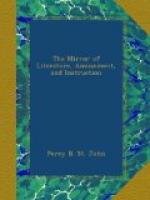In our last number we gave a flying extract, entitled, “Superstitions on the Weather,” being a fair specimen of the very agreeable manner of the digressions in the above work, which is, perhaps, less practical than it might have been; but this defect is more than atoned for in the author’s felicitous mode of intermingling with the main subject, some of the most curious facts and phenomena in natural history and philosophy so as to familiarize the angler with many causes and effects which altogether belong to a higher class of reading than that of mere amusement. All this, too, is done in a simple, graceful, and flowing style, always amusive, and sometimes humorously illustrative—advantages which our philosophical writers do not generally exhibit, but which are more or less evident in every page of Sir Humphry Davy’s writings.
Salmonia consists of a series of conversations between four characters—Halieus,[3] Poietes, Physicus, Ornither. In the “First Day” we have an ingenious vindication of fly fishing against the well-known satire of Johnson[4] and Lord Byron, and the following:—
Halieus.—A noble lady, long distinguished at court for pre-eminent beauty and grace, and whose mind possesses undying charms, has written some lines in my copy of Walton, which, if you will allow me, I will repeat to you:—
Albeit, gentle Angler, I
Delight not in thy trade,
Yet in thy pages there doth lie
So much of quaint simplicity,
So much of mind,
Of such good kind.
That none need be afraid,
Caught by thy cunning bait, this book,
To be ensnared on thy hook.
Gladly from thee, I’m lur’d to bear
With things that seem’d most vile
before,
For thou didst on poor subjects rear
Matter the wisest sage might hear.
And with a grace,
That doth efface
More laboured works, thy simple lore
Can teach us that thy skilful lines,
More than the scaly brood confines.
Our hearts and senses too, we see,
Rise quickly at thy master hand,
And ready to be caught by thee
Are lured to virtue willingly.
Content and peace,
With health and ease,
Walk by thy side. At thy command
We bid adieu to worldly care.
And joy in gifts that all may share.
Gladly with thee, I pace along.
And of sweet fancies dream;
Waiting till some inspired song,
Within my memory cherished long,
Comes fairer forth.
With more of worth;
Because that time upon its stream
Feathers and chaff will bear away,
But give to gems a brighter ray.
And though the charming and intellectual author of this poem is not an angler herself, yet I can quote the example of her lovely daughters to vindicate fly fishing from the charge of cruelty, and to prove that the most delicate and refined minds can take pleasure in this innocent amusement.




